In 2023, the 25th anniversary of EDUCAUSE, the association has updated its vision, mission, strategic priorities, and values. This article summarizes the important changes that will guide EDUCAUSE in the years ahead.

Strategic planning can be exceptionally valuable. When the focus is truly strategic, the plan reminds us of who we are, what we do, and why we care about what we do. Beyond the affirmation, planning points the way to the future and provides guidance for prioritizing efforts and investments. Since early this year, the EDUCAUSE Board of Directors and the executive team have been engaged in strategic planning for the next three to five years. This future planning has taken place in the year of our 25th anniversary, and the result is a powerful confluence of reflecting on our past and reimagining our future. This new EDUCAUSE strategic plan is a vital milestone for the association.
The EDUCAUSE Vision

A vision statement paints a picture of what success will look like at the end of the planning period, and it should be bold enough for a community to rally around. The new EDUCAUSE vision, with transformation at its center, is familiar and unique in important ways. In the unapologetic focus on transformation, the statement expresses our belief in the value of digital transformation. However, by not referring strictly to digital transformation, our vision makes it clear that this transformation is not the destination but, rather, is an enabler for a much larger transformation in higher education. With 87% of surveyed college and university presidents naming digital transformation as an essential, high, or medium priority on their campus,Footnote1 it's time to focus on where it is taking us--that is, on the larger transformation that it enables. Transformational business models and transformational approaches to supporting students come into focus when we acknowledge that the substantial challenges of higher education are what we are trying to tackle.
Paradoxically, what's not included in our vision statement may be as important as what is. The new vision statement, for example, does not include the word technology. This isn't because technology (singular) isn't critical to our vision but because technologies (plural) come and go. More important than the specific technologies we deploy or retire is the difference we are trying to make by using them. When higher education professionals are asked why they choose to work at colleges and universities, again and again our community members say that they are working to improve the circumstances of the communities, families, and students they serve. The updated EDUCAUSE vision statement intends to convey this sense that transformation of higher education is what will get us to a "greater good."
Also paradoxically foundational but intentionally absent from the vision statement is "IT." Information technology and CIOs are unquestionably the heart and soul of our community since the founding of EDUCAUSE twenty-five years ago. Even so, continuing to use "IT" as shorthand for "the EDUCAUSE community" is no longer adequate or even accurate. "IT" does not fully measure the length and breadth of our community, a fact that will become even more apparent as technology becomes even more ubiquitous throughout higher education. When thousands convene in Chicago for the 2023 EDUCAUSE annual conference, CIOs and IT professionals will be sharing ideas with and learning from cybersecurity professionals, teaching and learning professionals, provosts, faculty, research computing professionals, library professionals, institutional researchers, and many others.
In this way, the EDUCAUSE vision clearly states that our community thrives because of all those we include, not because of those we leave out. This hit home for me a few months ago when I visited the campuses of two EDUCAUSE board members. The shared passion at these two campuses was obvious, but there were dramatic differences as well. When I joined the all-staff meeting of Notre Dame CIO Jane Livingston, a large auditorium was needed to accommodate all of the technology professionals. A few weeks later, I joined Peter Angelos, Executive Information Officer at Fond du Lac Tribal and Community College, for his "all-staff" meeting, which was held at a small table. The new focus on the difference technology makes is palpable at these two significantly different types of institutions and so many others as well.
It has never been more important to focus on the greater good that higher education seeks to advance. Lately, this call has become increasingly lost in a larger, disappointing din. The headlines repeatedly report that Americans value colleges and universities less and less. A Gallup poll in July 2023 concluded that confidence in higher education, following declines from 2015 to 2018, has "declined further to a new low point."Footnote2
The EDUCAUSE Mission

Distinct from a future-forward vision statement, the mission of an organization is intended to concisely capture current objectives at a high level. Our new mission attempts the impossible, capturing all of this in just two sentences.
As anyone who has been part of a group developing a mission statement knows, every word is deeply intentional and represents potentially hours of important conversations. (An axiom of strategic planning is that these conversations are arguably as important as the resulting document.) So, it's meaningful that we begin our mission statement by invoking a commitment to leading the way. Our community's strength has always been its collective ability to point the way to success. EDUCAUSE staff also play an important role in marshaling resources and creating programs that bring the best thinking forward in our community.
Calling out the "strategic use of technology" in these two marquee sentences is a stake in the ground. Almost fifteen years ago, a keynote session at the EDUCAUSE annual conference featured a "debate" between Brad Wheeler, then CIO at Indiana University, and Brian Voss, then CIO at Louisiana State University, discussing whether the work of a CIO was primarily that of a plumber or a strategist.Footnote3 The need to highlight the strategy question as something "up for debate" in 2010 shows how far the community has come since then. The strategy/utility dichotomy no longer rings true in 2023 with the rise of the "integrative CIO."Footnote4 Strategists, innovators, and maintainers are individually and collectively essential—and always have been. What's changed is that campus technology strategy no longer needs to elbow its way into the conversation to the degree it once did.Footnote5
Also new in the EDUCAUSE mission is the inclusion of both technology and data. Even in the short months since the EDUCAUSE board finalized our mission statement, relatively early in the planning process, the wisdom of this addition has been impossible to ignore. We know that technology is in the foreground of the transformational work we are undertaking, but increasingly the data streams that used to be relatively invisible are becoming critical, expensive, and sometimes controversial. When I wrote about the state of digital ethics in 2020, data was a recurring theme.Footnote6 Since then it has become the story, especially as generative AI has dominated so many conversations. We expect to focus on data and technology as inseparable, interdependent critical elements—and to ensure attention to both in the years ahead.
For example, EDUCAUSE programs and resources show an intentional focus on data-related topics:
- The new EDUCAUSE Data Literacy Institute
- Embedded elements of data topics throughout the EDUCAUSE Institutes
- EDUCAUSE Demo Days on Data Governance Tools and Data Integration Technologies
- An EDUCAUSE Learning Lab on Data Governance Essentials
- Several webinars and QuickTalks related to EDUCAUSE Core Data Services (CDS) topics throughout the year
- Numerous sessions and opportunities on data at the EDUCAUSE 2023 Annual Conference
- Data Governance, Developing and Executing Data Strategy, and Higher Education Chief Data Officers (HE-CDO) Community Groups in EDUCAUSE Connect
- The Analytics Channel in EDUCAUSE Review
- Plans to produce a landscape study mapping the current state of analytics practices in higher education and to incorporate a data focus into existing EDUCAUSE research such as the student study and faculty studies
Finally, the mission statement's intention "to anticipate trends" is something EDUCAUSE has accomplished for many years with the annual Top 10 resources and the forward-looking Horizon Reports, but there's more caught up in this phrase. The stated ideas that EDUCAUSE will lead the way and will anticipate trends are connected. For the past few years, EDUCAUSE Research has been using concepts that futurists will recognize, identifying signals that are insightful in helping us to better understand the drivers of change and prepare for our future. Or, more accurately, our futures. After all, thinking about the future amounts to considering more than one future state and contemplating the differences between them in order to forge the best approach to the future we want.
Three Strategic Priorities
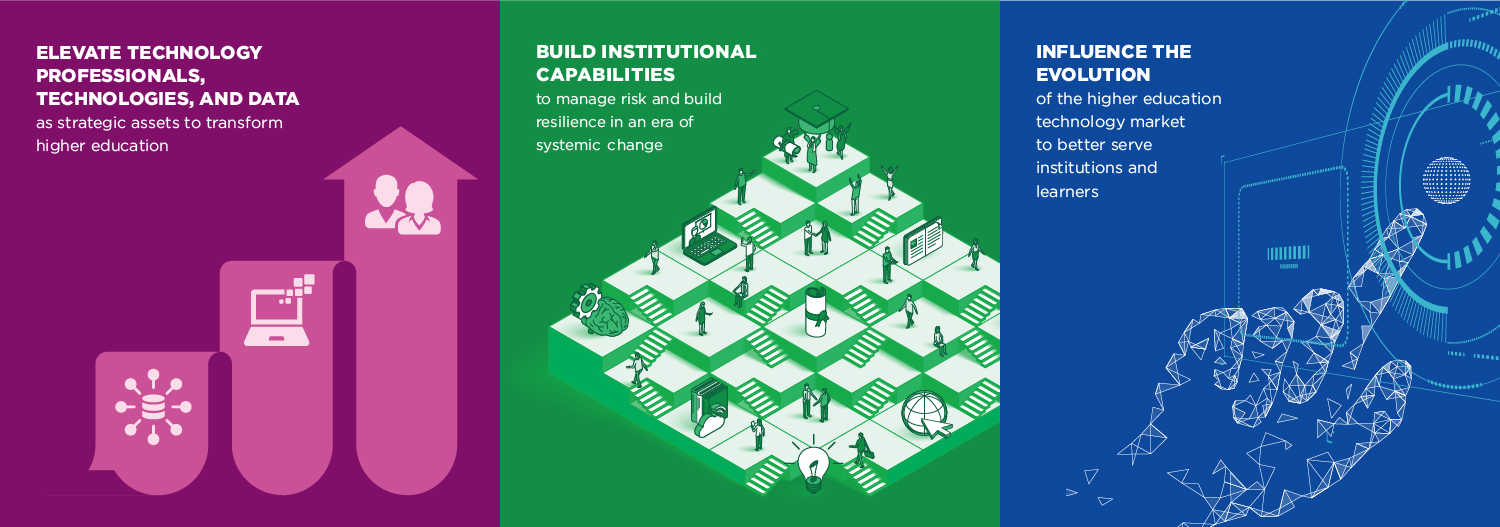
The real traction of any strategic plan comes from the priorities established for the planning period. As in 2017, we are focusing on only three high-level priorities for the next three to five years. With these priorities in place, we will organize our annual work around them while continuing to serve members with our other core offerings. In consultation and collaboration with our board, we'll make strategic investments over the years ahead to deliver on the promise of these priorities.Footnote7
Elevate technology professionals, technologies, and data as strategic assets to transform higher education.
This strategic priority is our broadest, encompassing several long-term goals that relate to fully realizing technology and data as strategic assets intentionally deployed in service to the greater good as defined by our member institutions. In the years ahead, through our programs, resources, and services, we will build on partnerships, critical conversations, and problem-solving to drive progress toward the transformation of higher education. We will be increasingly focused on making the case for change with concrete takeaways and approaches. One of the messages we received loud and clear through our membership survey conducted earlier this year is that we should be prioritizing practical, actionable, how-to resources for our members. You'll see a movement toward this emphasis in the insights shared in EDUCAUSE Review, in the illuminations provided by our research, and in our professional development opportunities. You'll see this shift even in the forthcoming 2024 Top 10 report, refactored to be more focused on insights and practices.
To advance this strategic priority, we expect to double down on the intersection between technology-enabled practices the student experience, students' learning, and more equitable outcomes. As I've written and also spoken about extensively over the past twelve months, one of the most remarkable changes across campuses since 2020 has been the demonstrable shift that has positioned students at the center of more campus priorities.Footnote8 Whether employed to address the mental health crisis on campus or to improve students' retention and success, technology and data offer great promise to address the most urgent of higher education's grand challenges.
Finally, the Great Resignation shone a bright light on our higher education technology work force and on the fact that attention must be paid to this potentially fragile link if campuses are to deliver on any institutional goals. Pre-pandemic, campus leaders could count on retaining great employees not because of exceptionally competitive pay but because college and university campuses are such desirable places to work. Post-pandemic, many employees are enthralled by the idea of working from home, and the higher education technology workforce is no exception.Footnote9 With continuing workforce uncertainty, we are committed to helping our members understand and prepare for workforce needs now and in the future through resources such as the EDUCAUSE Professional Pathways and through a more comprehensive and frequent cadence of workforce research studies.
I'm proud to see a continuing focus on diversity, equity, and inclusion (DEI) included in our strategic plan, as this has been a priority at EDUCAUSE for a number of years. One of our long-term goals in this strategic priority is to "establish DEI practices as normative across the higher education technology sector." At the time the goal was written, it seemed ambitious but also completely natural as the next step in moving this work forward. And then the world changed. Following the U.S. Supreme Court's June 2023 decision overturning affirmative action in admission policies,Footnote10 plans on many campuses to proceed with DEI goals now face powerful roadblocks across the United States. In fact, DEI is under siege. As tracking by the Chronicle of Higher Education tracking reveals, legislative action is in progress in more than twenty states to constrain or even outlaw elements of DEI.Footnote11 The fundamental concepts of DEI are suddenly being questioned in a polarized political landscape.
So, what does an organization such as EDUCAUSE do?
What we won't do is to recant the values that have driven our DEI initiatives. We continue to believe that more diverse teams make stronger teams, and we continue to believe that intentional efforts are needed to remove the barriers to make this possible. But we can't put our head in the sand and pretend that the strategies broadly embraced in 2022 will be as effective in 2023. We can't assume (we never have) that the realities in one state are the same as in another.
As part of the long-term goals derived from our strategic priorities, our focus for the next several years will be to build on our values and contribute to an ecosystem within our community and with our allies to create resources that support the profession and advance diversity, equity, and inclusion, with a focus on practical application.
Recently a colleague was explaining to me the concept of tacking. When the wind is to your back, sailing is easy, she said, but when you are sailing into the wind, the only option is a zig-zag pattern. This is not simple, straightforward, speedy, or risk-free, but it's the only choice you have—it's trickier still when the wind is changing directions rapidly. I believe that part of the "greater good" we are striving for in our version of stormy seas is for our member colleges and universities around the world to reimagine ways of doing things that would otherwise limit opportunities for some and grant unearned privilege to others. If some states introduce and pass laws that prohibit words and ways of talking about DEI or outlaw DEI staff positions,Footnote12 where EDUCAUSE intends to land won't change. There may be zigs within our zags, but we can continue to aim steadfastly for the same destination. And we will.
The urgency of this work, in my opinion, is more crucial than the choice of the words we use to describe it.
Build institutional capabilities to manage risk and build resilience in an era of systemic change.
This strategic priority will surprise no one. The risks and related intrigues managed by technology leaders stagger the imagination at times. A CIO recently asked me: "How is my overloaded team supposed to defend against several thousand sponsored hackers when they decide to go after our intellectual property?" This priority certainly encompasses the critical work of the EDUCAUSE Cybersecurity and Privacy Program, highlighted by the fast-growing Cybersecurity and Privacy Professionals Conference. And there are many additional technology-related risks tracked and mitigated by technology professionals around the world.
When it comes to risk management, EDUCAUSE will intensify its efforts to help institutional leaders assess their technology and data risk preparedness and work to mitigate those risks. At the same time, we know that these leaders are struggling to stay ahead of proposed policy and regulatory changes, and we will redouble our efforts to help them navigate this challenging space and share campus best practices around compliance related to technology, cybersecurity, and data privacy.
We are convinced that a critical approach to managing risk is bigger than the individual tactics involved in specific circumstances. We believe that along with these tactics, building institutional resilience into the DNA of the institution makes the biggest difference. Going forward guided by our new plan, EDUCAUSE is digging into resilience as an organizational framework and capability: the ability to respond, recover, and thrive in rapidly changing environments.Footnote13
In August 2022, EDUCAUSE conducted a QuickPoll on institutional resilience. One of the key findings was the acknowledged need for support and training to lead campuses in this area, to move from responding in a crisis to resilience:
"As one respondent noted, 'Responding to a crisis is the low bar of strategic planning. . . . It's harder to align and prioritize for an unknown future.' Indeed, as EDUCAUSE is currently conceiving the idea of resilience, developing this capability involves more than just crisis response. It also requires an ability to anticipate what's next and to adapt, over the long term, to changes in the institutional environment. Given this broader conception, we can see that many institutions still have far to go in building their resilience, even as they emerge from the [COVID-19] pandemic nimbler and wiser.'"
Interestingly, the survey respondents also reported that their local campus IT organizations were more resilient than the institution itself, presenting a wonderful opportunity—I would add—for our community to "lead the way" toward institutional change.Footnote14
EDUCAUSE is building on our definition of institutional resilience to identify key attributes of more resilient institutions while establishing a baseline for institutional resilience practices, issues, and needs. We've also just launched the new Cybersecurity and Privacy Guide, and we're working with our partners at Internet2 and REN-ISAC on improvements to the HECVAT (Higher Education Community Vendor Assessment Toolkit). In addition, in the years ahead we will integrate resources on institutional resilience into our larger body of work on digital transformation. Although much transformation is inspired by innovation and growth, a great deal is driven by risk and resilience.
Influence the evolution of the higher education technology market to better serve institutions and learners.
If you talk to someone who has just been to their first EDUCAUSE annual conference, it's almost guaranteed that the exhibit hall will come up in the conversation. Few higher education conferences have such a strong presence from the companies that serve the higher education market. Some attendees are thrilled to have such a critical mass of product providers to explore; some are overwhelmed. In short, there is a lot of activity at the intersection of higher education professionals and solutions providers in the EDUCAUSE community. The intensity of activity makes sense, since our community understands, better than most others, that the future of higher education is significantly dependent on the technology purchased and the services sourced. This strategic priority invites EDUCAUSE to consider ways to influence the market beyond the power of bringing campus and industry staff and leaders together.
This priority doesn't light up a well-worn pathway; as a result, the directions we will pursue for this strategic priority are not completely determined. However, we know that success amounts, in part, to finding new ways to amplify and elevate campus users' voices to press for more responsive higher education products.
We also are not starting from scratch, by any means. We have a twenty-year history of gathering data and benchmarking on institutional practices in the Core Data Services. The EDUCAUSE Analytics Services Portal contains not only the CDS but also our latest spin-off: the Technology Solutions Market Dashboard, which allows a user to explore specific technology products and their use by other member colleges and universities. This offering is just getting started, but it is one example of how we plan to build products and offerings to help our members make decisions in a marketplace that has become more complicated and more crowded.
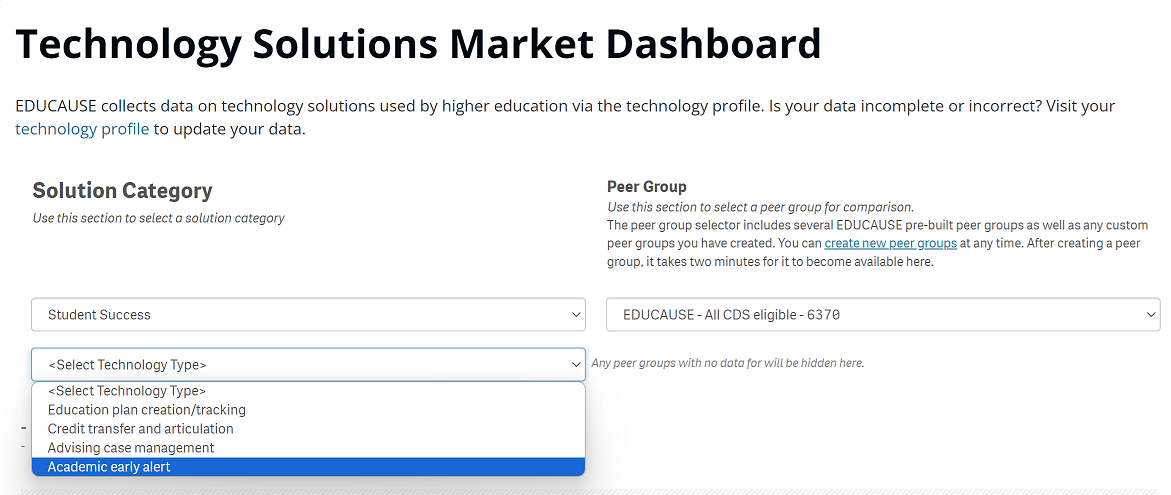
In addition, the relatively new CourseGateway, an initiative built with the support of the Bill & Melinda Gates Foundation, offers comparative insights and reviews by an independent Product Advisory Board. Users can evaluate courseware options for "gateway courses," the introductory-level courses that present one of the biggest obstacles to student success.
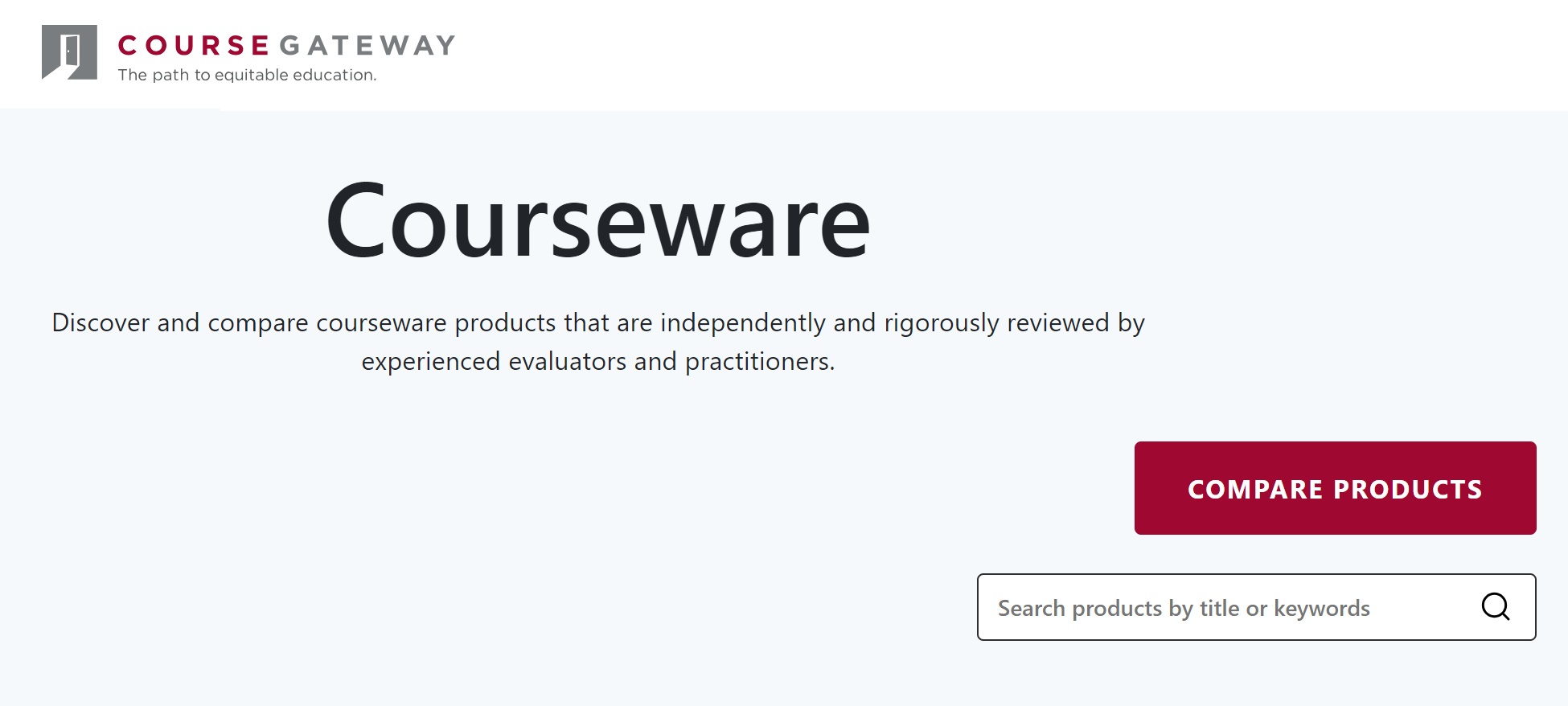
These are two important examples of the kind of work EDUCAUSE will pursue in the coming years to help our members make more informed decisions about buying and using technology to achieve institutional goals.
The work we plan for this strategic priority easily connects and integrates with our work planned for the other two priorities. For example, compliance with corporate members' expectations around cybersecurity and privacy is effectively handled through the completion of the HECVAT, so we could consider ways to feature and applaud those companies that use the HECVAT. Should there be a booth badge for those exhibitors at the annual conference? Should they get a discount, or should those who haven't completed the HECVAT pay a surcharge? Ideas like these need to be thought through carefully, but we are committed to doing so—not alone but with advice from the EDUCAUSE Corporate Engagement Advisory Committee (CEAC), which includes both institutional and corporate members.
As this work moves forward, so will the opportunity not just to report on how the EDUCAUSE community is responding to products we rely on but to influence product development. This kind of influence can be intensified through deep and authentic partnerships built over time and based in mutual values, shared goals, transparency, and collaboration, and there may be no better example of or opportunity for meaningful partnership than the case of product developments related to generative AI. In a recent survey, two-thirds of the higher education presidents/chancellors, provosts, and CFOs who responded said that their institution will "need to partner with the private sector to implement or manage new developments around artificial intelligence."Footnote15 Considering the powerful connections we have with corporate members in EDUCAUSE, we expect to effectively catalyze collaboration and partnership in this and other areas.
Although the work we will do to advance this priority is less defined, the possibilities are also uniquely promising. We could work with corporate members to host product road-mapping sessions at our annual conference or bring corporate partners together with interested campus leaders to gain critical information on how to make their offerings more compelling for their customers. We could expand the EDUCAUSE Demo Days by looking for other ways to connect campus stakeholders who are looking for more information at their point and time of need. Demo Day topics are picked based on the needs of the community, and these needs drive every step of the process (instead of being driven by suppliers' timelines). The natural extension of Demo Days could be to find other appropriate ways for EDUCAUSE to serve as an effective convener or to scale Demo Days. The ultimate innovation would be to move beyond helping campuses merely find the products they need; EDUCAUSE might connect campus technology users' needs for products that haven't been created yet with suppliers willing to work as partners to bring these solutions to life.
I can see a future in which sales associates find intrusive "cold call" contacts the least effective and least often deployed tool in their toolbox because EDUCAUSE has helped them find better, more effective tactics—and ones that also build fruitful relationships within our community. In support of this vision, we recently added the Higher Ed Guide for the Corporate Community to our professional development portfolio. This program is designed to help our corporate members understand the unique and complicated characteristics of higher education organizational structures, decision-making processes, procurement practices, funding models, and stakeholders. The program will help corporate members engage productively within the higher education community--and in ways that the community will welcome. EDUCAUSE is in a unique position to find a better way.
EDUCAUSE Values
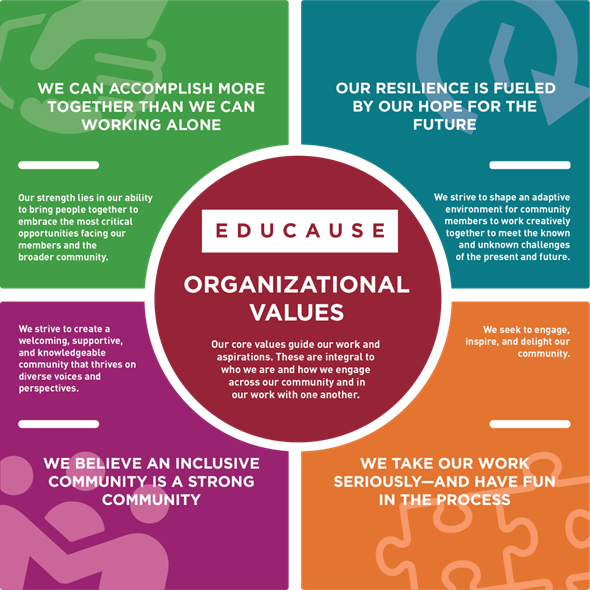
Credit: Jeff Lowther, © EDUCAUSE
The best way to conclude this discussion of the EDUCAUSE vision, mission, and strategic priorities is to share the four updated EDUCAUSE values, which together will inspire and shape our work in the years ahead. The first three are directly integrated into our strategic priorities as noted above.
We can accomplish more together than we can working alone. The imperative to partner is vital, since it is our ability to convene communities that gives us the traction to contribute to a greater good. It's a foundational capability for our community and for the EDUCAUSE staff and leadership.
We believe an inclusive community is a strong community. As noted above, this fundamental value will continue to be prioritized.
Our resilience is fueled by our hope for the future. The core value of resilience is going to play an important part in how we serve our members in the years ahead.
We take our work seriously—and have fun in the process. The only value that may come as a surprise is our declaring that we have fun. This value is woven throughout the work of our three strategic priorities. The gravity of what our community accomplishes and the high stakes involved lend themselves to a certain seriousness. Through the approximately sixty years of our existence (twenty-five years as EDUCAUSE and thirty-six separately as CAUSE and Educom), we have had to be serious because we were working to be recognized as a strategic asset.
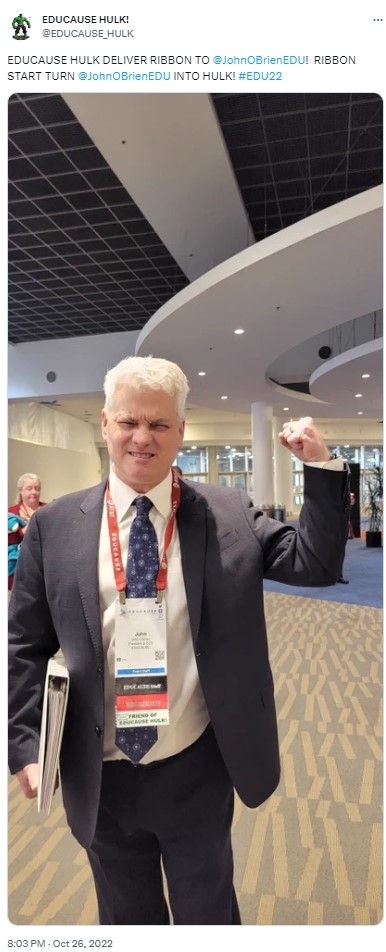
In light of the pandemic-accelerated elevation of strategic technology, I think we might embrace some fun now and again. In fact, this might be not only a value but a way to survive, part of our resilience capability. Whether EDUCAUSE members have fun at the annual conference by sporting outlandish logo-wear socks (wait until you see what we are giving out at EDU23), participating in an introvert Braindate meetup (really, this is a thing), adding flair to conference badges, or lobbying to bring back karaoke night (we're thinking about it), we want to celebrate the joyfulness of our community.
Speaking of conference badges… Shortly after we created the EDUCAUSE Young Professionals Community Group in 2016, members began to ask if they could add a playful conference ribbon or two. We answered no, explaining that conference ribbons were "for official use only." That was when I learned that the "Friend of EDUCAUSE Hulk" ribbon I enjoyed getting every year at the annual conference was shared as something of an illicit commodity. (I imagined contraband Hulk ribbons passed from member to member via unmarked envelopes in dark hallways.)
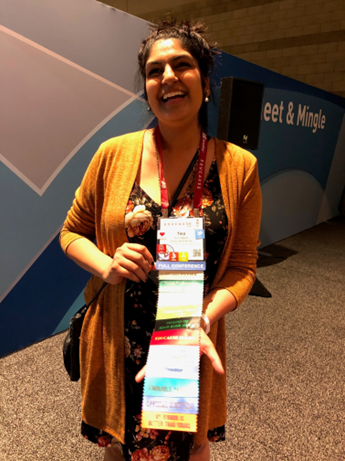
Eventually, I'm happy to say, we relented—as evidenced by Tina Pappas, the 2019 EDUCAUSE Rising Star Award winner, sporting several feet of deeply irreverent conference ribbons, including the coveted "Troublemaker" and "Official Something" ribbons.Footnote16 Tina's final meta-ribbon—"My Ribbon Is Better Than Yours"—says it all, making clear what the next generation of EDUCAUSE leaders has to say about any ribbon-restricting sense of our own self-importance.
Your Future, Your Help
Engaging in a planning process and sharing the result is energizing. Ten years ago, I never would have been able to predict the world we currently inhabit, and I have every reason to believe the future will be bright—but with a few more zigs and zags than we are able to articulate in 2023.
What is certainly going to be a critical feature of whatever future unfolds for EDUCAUSE is that your help is vital. You, the technology professionals reading this article and making it to the last page, are going to shape this future and determine how successful we will all be in reaching our goals. When you invest in our community by volunteering for committees or advisory groups, by leading the way in community groups, by sharing your insights in EDUCAUSE Review articles and multimedia, and by making our events exceptional with your presentations and presence, you honor the greater good that EDUCAUSE envisions.
Notes
- John O'Brien, "Presidents' Views on Digital Transformation: 3 Reasons to Be Hopeful," EDUCAUSE Review, June 21, 2023. Jump back to footnote 1 in the text.
- Paul Tough, "Americans Are Losing Faith in the Value of College: Whose Fault Is That?" New York Times Magazine, September 5, 2023; Karin Fischer, "Americans' Confidence in Higher Ed Drops Sharply," Chronicle of Higher Education, July 26, 2022; Katherine Knott, "Gen Z's Distrust in Higher Ed a `Red Flag,'" Inside Higher Ed, August 11, 2022; Megan Brenan, "Americans' Confidence in Higher Education Down Sharply," Gallup (website), July 11, 2023. Jump back to footnote 2 in the text.
- "The CIO: Plumber or Strategist?" EDUCAUSE Annual Conference, October 14, 2010. Jump back to footnote 3 in the text.
- See "Issue #10: The Integrative CIO," in Susan Grajek and the 2019–2020 EDUCAUSE IT Issues Panel, "Top 10 IT Issues, 2020: The Drive to Digital Transformation Begins," EDUCAUSE Review, January 27, 2020. Jump back to footnote 4 in the text.
- Certainly, the COVID-19 pandemic accelerated what was a more measured process of elevating the strategic value of our work. See D. Christopher Brooks, "EDUCAUSE QuickPoll Results: Senior IT Leadership," EDUCAUSE Review, October 9, 2020. The survey results not only showed an increase in operational and strategic influence for campus technology but also affirmed a strong conviction that this elevation wouldn't collapse post-pandemic. Jump back to footnote 5 in the text.
- John O'Brien, "Digital Ethics in Higher Education: 2020," EDUCAUSE Review, May 18, 2020. Jump back to footnote 6 in the text.
- Long-term goals for the three strategic priorities are necessarily high level in order to give us room every year to determine a range of possible actions and deliverables that will get us closer to realizing our vision. We'll be providing the board with regular updates on our progress at each board meeting, and we'll provide updates on our annual goals for all members at the live (and recorded) Annual Business Meeting, being held this year on Thursday, November 30, at 2 pm ET / 11 am PT. Jump back to footnote 7 in the text.
- John O'Brien, "Higher Education in Motion: The Digital and Cultural Transformations Ahead," EDUCAUSE Review, October 18, 2022. Jump back to footnote 8 in the text.
- According to an EDUCAUSE QuickPoll, 55% of survey respondents are “strongly considering” leaving their current position or are planning to retire soon. Mark McCormack, “EDUCAUSE QuickPoll Results: The Workforce Shakeup,” EDUCAUSE Review, March 4, 2022. Jump back to footnote 9 in the text.
- Amanda Heidt, "Universities Axe Diversity Statements in Wake of US Supreme Court Ruling on Affirmative Action," Nature, September 27, 2023. Jump back to footnote 10 in the text.
- "DEI Legislation Tracker," Chronicle of Higher Education, updated July 14, 2023. Jump back to footnote 11 in the text.
- The architect of model legislation to reverse DEI advances is quite transparent about his goals. When told in an interview that his words will likely be read by people working in diversity offices, he replied: "That's awkward. I'm trying to, you know, eliminate their jobs." (Sarah Brown, “Race on Campus: The Campaign to End Diversity Offices,” Chronicle of Higher Education, February 7, 2023)
- The EDUCAUSE Institutional Resilience Task Force defines institutional resilience as "the ability to anticipate, respond to, and adapt to rapidly changing circumstances in ways that maximize opportunities and minimize consequences of unforeseen events." The task force adds: "More resilient institutions anticipate stakeholders' needs to advance the mission and objective of the institution, foster collaboration, and improve equity by involving all impacted communities and resource ecosystems." See Susan Grajek and the 2023–2024 EDUCAUSE Top 10 Panel, "2024 EDUCAUSE Top 10: Institutional Resilience," EDUCAUSE Review, October 16, 2023 (forthcoming). Jump back to footnote 13 in the text.
- Mark McCormack, "EDUCAUSE QuickPoll Results: Institutional and IT Resilience," EDUCAUSE Review, August 8, 2022. Jump back to footnote 14 in the text.
- "The Chronicle of Higher Education & P3•EDU 2023 Public-Private Partnership Survey: Key Findings" (no date), accessed September 28, 2023. Jump back to footnote 15 in the text.
- At times one playful ribbon is not enough, as evidenced by EDUCAUSE board member Sandeep Sidhu's double "Troublemaker" lanyard bling at last year's conference: @LeadByValues, "Day 1 was above expectations! Sweet dreams Denver and #edu22 attendees," Twitter, October 25, 2022, 9:56 PM. Jump back to footnote 16 in the text.
John O'Brien is President and CEO of EDUCAUSE.
© 2023 John O'Brien. The text of this work is licensed under a Creative Commons BY-NC-ND 4.0 International License.
